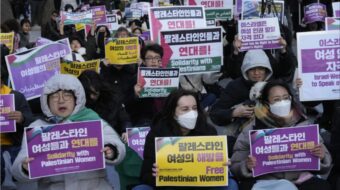He has visibly aged since he was run out of Haiti in 1986. He still has the malevolent stare he inherited, along with the presidency, from his father, Francois “Papa Doc” Duvalier, president of Haiti from 1956 until his death in 1971.
The return of former dictator Jean-Claude “Baby Doc” Duvalier to Haiti on Sunday, Jan. 16, has further unsettled an already chaotic situation.
Duvalier senior was one of the worst tyrants to rule in the Americas in the 20th century, and his son was a chip off the old block. Ruling through a super-violent militia called the “Tonton Macoute” (bogeyman), the Duvaliers, father and son, are thought to have murdered up to 60,000 political enemies. They stripped Haiti bare. But they were supported by the United States, because they were stalwart anti-communists.
When Baby Doc was finally overthrown in 1986, the Tonton Macoute and military stayed behind, protecting the interests of a tiny opulent minority. A radical priest, Jean Bertrand Aristide, swept the presidential elections of 1991, but was quickly overthrown by the military. In 1994, the U.S. administration of Bill Clinton intervened to return Aristide to power, exacting trade concessions that harmed Haitian small farmers. Aristide was elected again in 2001 but was overthrown once more by the Bush administration in 2004.
Then came a United Nations intervention that has been resented by the Haitian poor, last year’s earthquake and a cholera epidemic that has killed 4,000 people. Billions in earthquake reconstruction aid has been trickling in at a snail’s pace.
Haiti’s Nov. 28 election was marred by fraud and disorganization. Aristide’s party, Fanmi Lavalas, was barred on the basis of ridiculous technicalities. Many could not vote. A panel from the Organization of American States is calling for the Haitian government to change the results so a runoff, as yet not scheduled, would be between Mirland Manigat and Michel Martelly, instead of between Manigat and the current government’s favorite candidate, Jude Celestine. Both Manigat and, especially, Martelly have Duvalierist connections. The government so far has resisted this demand.
People are asking, “Who facilitated Baby Doc’s return? Is some powerful country backing Duvalier?” He traveled on an expired diplomatic passport. The French government says it was not aware of Duvalier’s plans. Haitian Prime Minister Max Bellarive simply remarked that all Haitian citizens have a right to be in their homeland.
“Really?” asks former President Jean Bertrand Aristide from exile in South Africa. Aristide’s overthrow occurred reportedly at the instigation of the French and U.S. governments who were angry, partly because Aristide kept needling the French to repay Haiti $21 billion for money they had extorted at gunpoint during the 19th century. Aristide, who says he has medical problems that cause him discomfort in South Africa’s sometimes chilly winters, has not ceased to demand the right to return, but the government of his former ally, President Rene Preval, refuses to renew his passport. On Wednesday, Aristide once again demanded the right to return.
Trey Wilkinson of the Los Angeles Times speculates that Duvalier’s timing may have to do with personal finances. When he left Haiti, Baby Doc reportedly cleaned out the treasury and absconded with hundreds of millions of dollars, which he stashed in Swiss bank accounts. He lost most of this in legal actions, especially his divorce. What remains was frozen in Switzerland, but may be handed over to the Haitian government on Feb. 1. So Duvalier may want to be in Haiti to try to recapture that money.
Runoff elections have not been scheduled. Preval must, by law, leave office by Feb. 7. Perhaps Duvalier and his supporters hope to use a power vacuum to stage a comeback.
In the United States, Rep. Maxine Waters, D-Calif., issued a statement on the return of Baby Doc, in which she blasted the mishandling of the elections and added “I am deeply concerned that the wealthy elites of Haiti who supported Duvalier’s regime in the past, along with the assistance of international agencies, may have encouraged Duvalier to return in the hope that the flawed elections will create a power vacuum that could allow him to take power once again. I am even more concerned that OAS officials may be wittingly or unwittingly helping to create precisely the type of power vacuum that would enable him to do so”
Duvalier was going to give a press conference on Wednesday, but instead was briefly arrested and interrogated, then released. The Haitian government says it may prosecute him for embezzlement and theft, but says nothing about murder and the violation of human rights. Lawsuits are being filed by individuals who suffered at the hands of his Tonton Macoute.












Comments